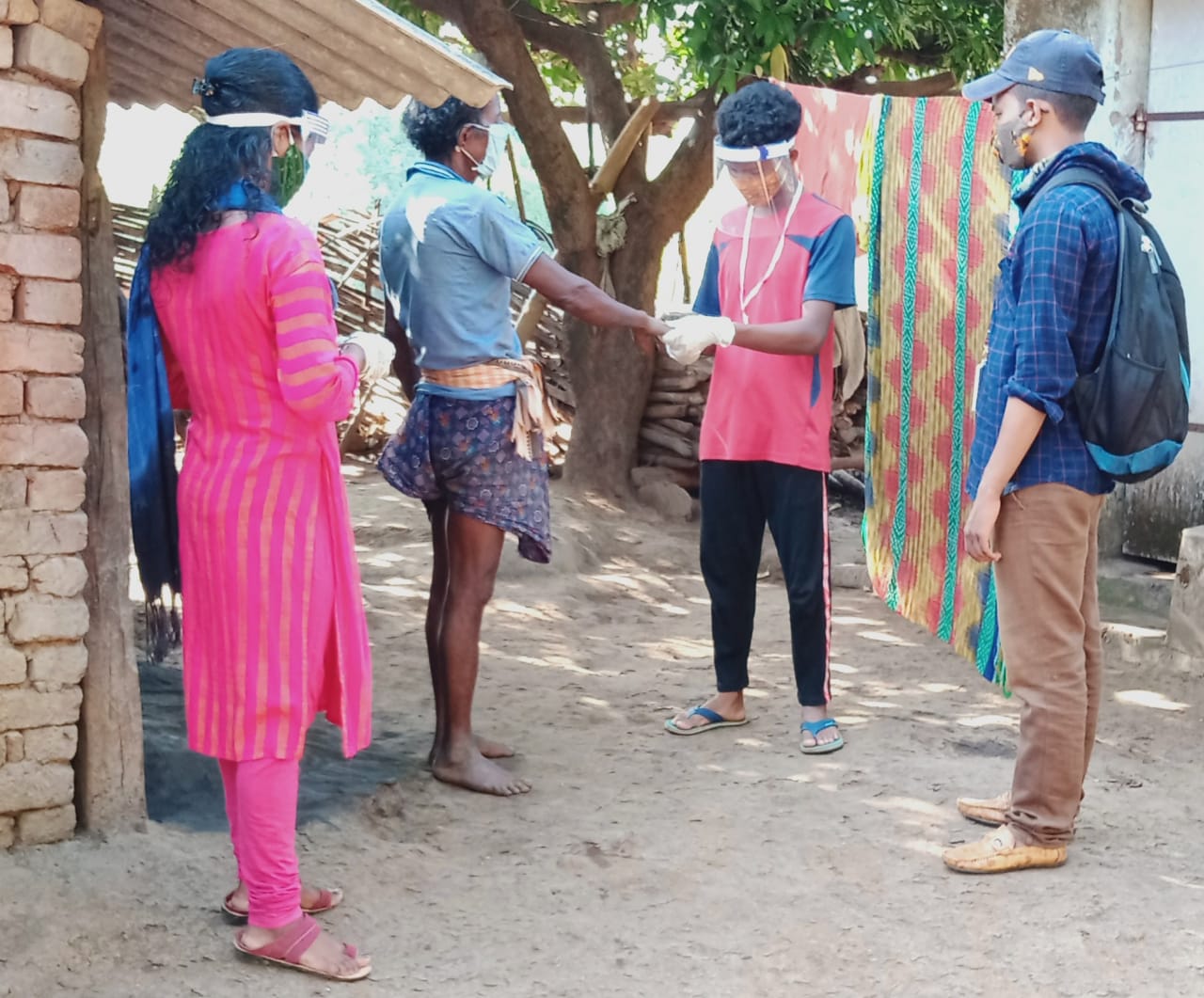Local volunteers fight COVID misinformation to get remote village communities timely and needed care
StoryBy Chandrika Patnaik, Tazeen Qureshy
29 June 2021
Trained local community volunteers support the frontline health workers and local administration to keep COVID away from rural Odisha.

Our trained village volunteers on door to door visit for COVID-19 surveillance.
Photograph by Basanta Naik.
Reena Naik of Dhamanguda village in Kalahandi district would usually spend her time either helping her mother or idling around the house. When the second wave of Covid-19 penetrated remote habitations of the state, including her village, she decided to put her best foot forward. She took part in the training conducted by Gram Vikas on Covid appropriate behavior in its project office in Kumudabahal.
“We have been saving lives here. I am glad I took this up. We wear Covid appropriate protective clothing and gear to keep ourselves safe as we make the visits. Nowadays, people don’t hide from us anymore. They are responding positively to our visit”, says Reena.
Along with Reena, 53 volunteers from three Gram Panchayats of Thuamul Rampur block also received training on safety protocols like wearing masks, distancing and avoiding gatherings. They were also trained on identifying Covid-19 symptoms, the Do’s and Don’ts during home isolation and gauging the seriousness of the patient’s condition, and the use of Oximeters.
These trained volunteers are accompanying health workers, ward members, and Sarpanches in 53 habitations in the Thuamul Rampur block.
“The nearest Community Health Care Center is 6 kms away, so people need to have basic awareness about Covid-19. I am glad to assist frontline workers in this awareness campaign. While going for awareness campaigns, all of us wear PPE kits and follow the guidelines,” says Reena.
The volunteers and frontline workers faced a major challenge of tackling the spread of misinformation through misleading WhatsApp messages and then word of mouth. Community members refused to consider fever as a symptom of Covid and feared death from vaccination. They feared that once tested positive, they would be admitted at the CHC and their organs would be removed. Many did not know that they could get well by self-isolating at home.
Dasarath Majhi from Dhamanguda village, who completed his X board exams in 2019 and was helping his father, a farmer, also received training from Gram Vikas. Dasarath recounts the initial resistance, “The first few days when we visited people, they would refuse to come out of the house. Some even shouted at us and asked us to go away. It took some time, but people started trusting us. It also helped that Reena and I were from the village and spoke the local language.”
The training has helped the volunteers in early identification of patients and getting them the necessary care. “In the first week of our door to door surveillance, we identified five people who had Covid-19 symptoms. I convinced them to visit the hospital and are under treatment in home isolation,” Dasarath says.
Basanta Naik, a Gram Vikas staff working in a project site in Ganjam district, was at home in his village in Dhamanguda, when the lockdown was announced on 04 May in the state. He noticed that at least 20-25 people in his village had Covid-19 symptoms. “I informed the Community Health Center, and they came to the village and tested the residents with the symptoms. At least 11 were found to be positive with the Covid-19 infection. Along with Reena and Dasaratha, Urvashi Majhi and I were also trained by Gram Vikas.”
Young boys with smartphones in the village have created a WhatsApp group called ‘Dhamanguda group’, through which verified information on COVID-19 messages and videos are circulated. The group helps in fight against misinformation, busts rumours, and prevents circulation of unverified videos and messages.
The efforts of the volunteers have helped fight COVID better in the villages.
As a result of their community outreach, 80 men and women, from the 18-44 years age group, have already taken the vaccine.
“People were skeptical initially, but they don’t hide from us any more. Somehow, they trust us more,” says Basanta with a smile.
Reena Naik and Dasarath Majhi are two active volunteers in Dhamanguda village.
Photograph by Basanta Naik.
ACKNOWLEDGEMENT
Basanta Naik and Bhabani Shankar Dash supported in field reporting. Priya Pillai edited the story.
ABOUT THE AUTHOR
Chandrika Patnaik is with the Communications Team at Gram Vikas and leads on content production. Tazeen Qureshy is an independent journalist.
RELATED BLOGPOSTS
Turning losses into gains: How Mallipanka farmers find success in new crops
Reviving agriculture: Mallipanka’s first strawberry farm story.
Ensuring dignity beyond life: supporting migrant families in their darkest hours
Gram Vikas ensures safe migration and dignified repatriation for deceased migrant workers, supporting bereaved families.
Collective leadership transforms ageing overhead water tank to secure household water supply for all
Kalakhadi’s aging overhead tank revived through collective leadership, ensuring sustainable water supply for the community.